
Alex Zandra is a Canadian game designer, streamer and light novelist. She makes all kinds of stuff on her Patreon. You can find her on Twitter @zandravandra and watch her stream on Twitch.
Hey hi folks! I’m so glad to be here. I’m so glad you’re here, too. <3
Last year was a lot. I think I grew more as a person than I have in a very long time, in no small part thanks to a metric tonne of heavy-duty therapy. But it’s been a lot of grueling, exhausting work! And also, like… the pandemic’s been rough. We were not meant to be apart for so long. Fingers crossed this year will be kinder to all of us.
To be fair though, last year wasn’t all bad. I finally got to hang out with loved ones! In person!! Gosh, I needed that so much. I also got to write some more (as usual, not as much as I would’ve liked to)—did I ever mention the light novel thing? The time I got so angry at Nintendo I wrote and illustrated a book? Because that’s a thing that happened, and kept happening, and now six books later that’s how I make most of a living: writing about queer messes figuring themselves out in increasingly outlandish ways.
And streaming! Though it’s been hard to find the energy, streaming has been a positive source of energy for a while now and I plan to keep on doing that as long as I can. I’ve also recently branched out; Zandrabot, my robot vtuber daughter, has started streaming on her own as well! I’m so proud of her.
And honestly I’m so proud of all of us for making it this far. It’s 2022! We’re here, we made it! Let’s give ourselves a much-needed break. And while you get settled, I’ll continue one of my favorite yearly traditions: telling you all about my favorite games of last year. <3
Honorable Mentions
Cutting my list down to 10 was REALLY difficult this year, but thankfully my girlfriend Amber reminded me that honorable mentions are a thing. So before I get to the list proper, here are a few standout games that I feel really deserve a shoutout:
- if you like deckbuilding roguelikes, you should give Loop Hero a look, see if it’s your kind of thing, because it’s just so clever both with its mechanics and its take on medieval fantasy,
- if you really like deckbuilding roguelikes, you should not give Inscryption a look and instead play it completely unspoiled because it’s incredible,
- if you want to build a motorcycle and go on a beautiful, introspective coming-of-age adventure, Sable definitely deserves a bit of your time,
- and if you want to TURN INTO a motorcycle, then go play Transiruby because it’s a total blast.
Alright! With that out of the way, let’s get to the ten games of 2021 that I want to gush about the most.
10. Boyfriend Dungeon
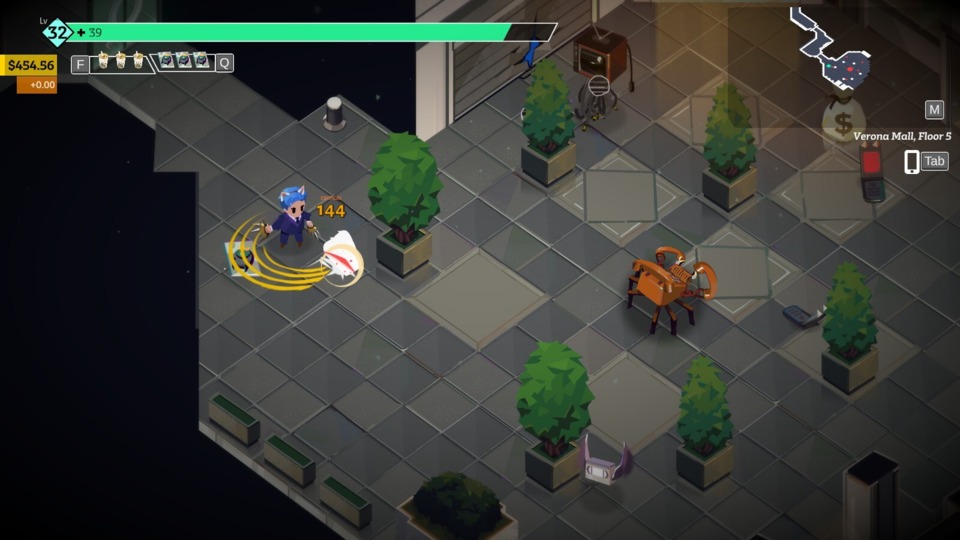
From the first moment I got my hands on Boyfriend Dungeon years ago at an indie event over in Toronto (I miss you Toronto friends ;_;) I knew I wouldn’t be able to stream it. It was a very short work-in-progress demo, but just a brief in-game conversation with Valeria was enough to get me all flustered. And that’s not something I like sharing with an audience!
So I took my time with this action roguelike, and played it at my own pace during my off hours. Which, for someone like me who’s always got streaming in the back of her mind, was something I really needed last year. And it turns out this game was perfect for bite-size, pick-up-and-play sessions.
But back to Valeria; she’s a polyamorous painter who transforms into a literal dagger. Because that’s the whole premise of Boyfriend Dungeon’s dating-game-meets-dungeon-delving: a town with a dungeon problem, a bunch of lonely residents with the ability to transform into weapons, and a giant queer disaster—that’s you!—who’s going to solve it all in the most reckless way possible.
I guess it’s no wonder I got so much into this game, what with me literally making a living from writing about shy nerds turning into catgirls and witches’ familiars. But I’ve found that the best way forward is to embrace what I do earnestly, and good gosh does this game do the same. Boyfriend Dungeon is actually way more of a game about the highs and lows of social dynamics than its elevator pitch would let folks believe. There are a bunch of wonderfully romantic storylines here, some of which end on a high note—one of which, coincidentally, ends exactly like the very first short story I wrote as a teenager (you’ll know which one)—but also some that can end platonically, if they end on good terms at all. There are more disasters than you, it turns out. At least one character is a downright creep!
But it’s all handled surprisingly well, and you’re never truly alone. Just as you’ve got a lot of supportive people in your corner, sometimes it’s clear you’re the supporting role in someone else’s story. I think that’s what makes the game world all the more believable: you’re not the only center of attention, but you’re also not the only mess. And that, too, was something I really needed to hear last year.
9. Beast Breaker
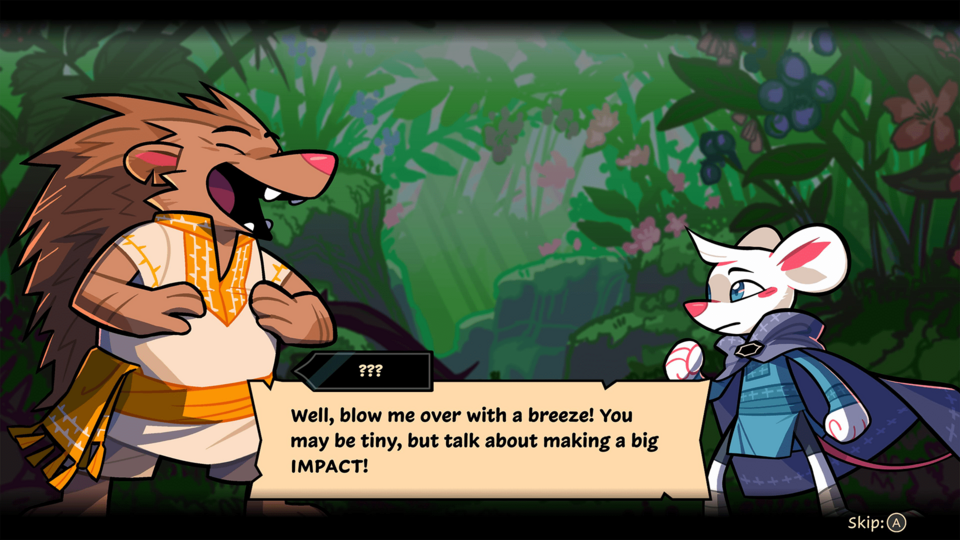
Something I always need is more mouse content, which is why I was so happy to play Beast Breaker! I haven’t finished it yet—I’m savoring it like a fine cheese—but the time spent with this mouse-bouncing RPG (as developer Vodeo Games describes it) has made my heart soar.
Mechanically, the geometric puzzle aspect of ricocheting your way to a giant beast’s weak points is extremely my jam. And the characters are wonderful?? Porcupine punsters, cheerleader chipmunks, pompous cockatiels, powerful grandmas… and a nonbinary mouse hero!! I’m in love. This game looks like a European comic book from my childhood, and I’m in love. (I really mean it, the art in Beast Breaker is breathtaking.)
Also, shoutout to Vodeo Games for being the first video game studio in North America to unionize! When we’re small, we gotta stand together. <3
8. Astalon: Tears of the Earth
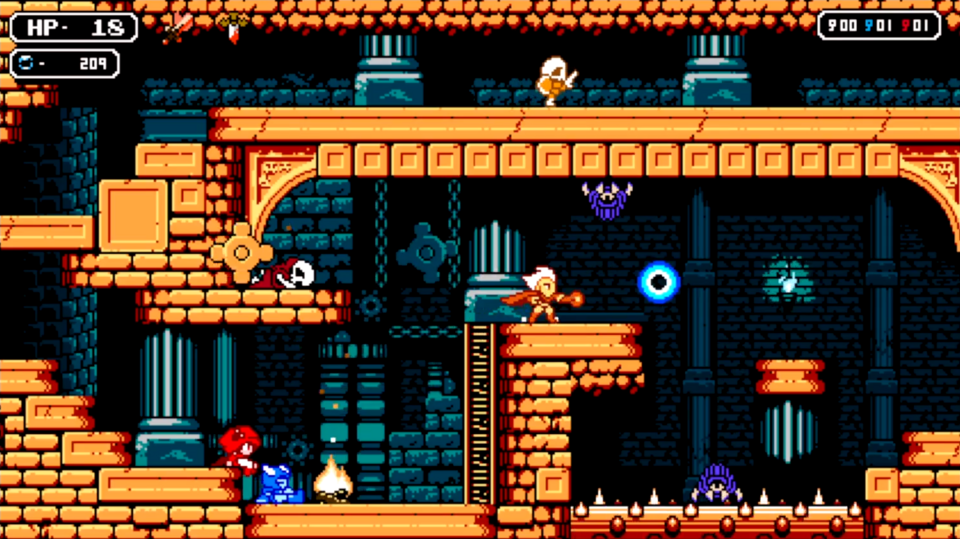
Going back to art styles from my childhood: I want to make games that look like this. Astalon’s pixel art aesthetic won me over instantly, evoking just the right mix of NES nostalgia and modern-day design. It pulled me in with a simple but clever premise: a party of adventurers enter a dangerous tower full of traps to put an end to the source of the poison tainting their village’s water supply. You control one person at a time, switching out your active character at the various campsites along the way (made apparent by the fact that the music playing at the time will shift into a “safe” version when a bonfire is on-screen).
It’s so nifty how this works in a metroidvania! Since each party member has their own unique combat and mobility abilities, you’re likely to come across alternate paths that you currently can’t take, but that a different character can return for. This also means some areas are specifically meant to be cleared out by one member before another can proceed—and then everything changes again when someone you weren’t using all that much gets an upgrade that turns the entire routing on its head. And because you can only take one character into each boss fight, who you’re going with dramatically affects how you need to approach the fight. It’s just so clever all around!
Even MORE clever is how the post-game is handled, with ways to revisit the existing map with completely new abilities. Astalon is a really satisfying game to play and the rest of the world stopped existing for a few days while I fell into its depths.
7. Dungeon Encounters
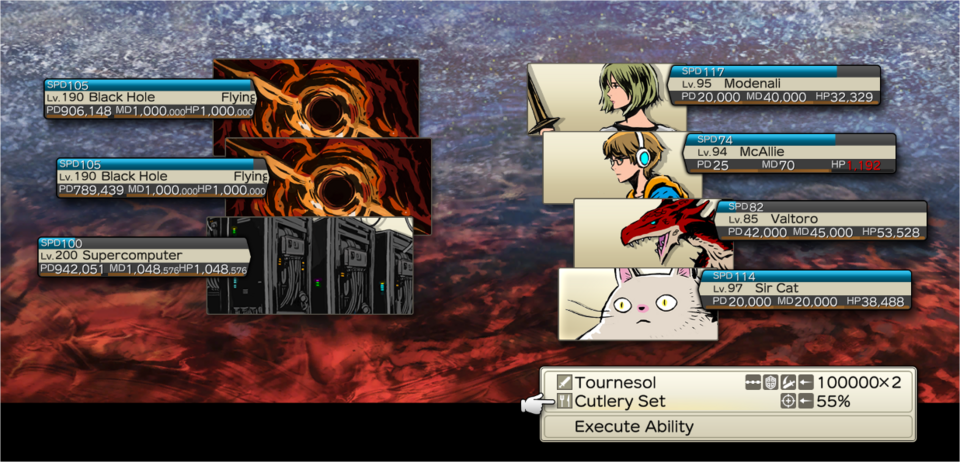
At least when you fall in Astalon, you eventually hit the ground; Dungeon Encounters affords you no such mercy. As soon as I got the ability to descend several floors at once, I hit that elevator button repeatedly just to get a peek at what the game had been keeping from me. Predictably, a few missteps later my entire party had been catapulted into the limitless abyss and scattered to the winds. Without missing a beat, the game gently cut back to the first floor and suggested I assemble a new party.
That’s where Dungeon Encounters begins, fittingly enough: floor zero, the Academy, where you get to put together a group of up to four adventurers before venturing forth. The entire list is complete right from the get-go, because this game hides almost nothing from you. Every single character is visible from the start; most are lost, of course—like my aforementioned team—and others are just waiting for you to meet up with them so you can add them to your roster. And they’re all extremely similar from a mechanical standpoint, the only difference being what few stats they have and what they can equip. Along with their backstories, of course.
Dungeon Encounters was made by the designer of Final Fantasy’s Action Time Battle system and is one of the most specific games I’ve ever played. It is a game designer’s game through and through and I love it so much. There’s almost no plot aside from a screen or two at the start; almost no storyline aside from the blurb each character gets on the roster. It is a game about mapping a hundred-floor dungeon and dealing with the foes and obstacles you encounter. That’s it, that’s the whole game. It is beautiful in its simplicity.
That said, if that doesn’t sound super interesting to you, that’s totally fair! It’s not a game for everyone. I wasn’t sure it was a game for me! But I saw a friend play it, my interest was piqued, and a week later I’d 100%ed the entire thing.
The combat is surprisingly fun for how incredibly distilled it is. No formulas here—if a weapon does 100 damage, then it does 100 damage (if it’s a fixed damage weapon like a sword) or 1-100 damage (if it’s a random damage weapon like an axe or a gun). Everyone has two defenses, physical and magical, plus their health once either of those are depleted. It seems so simple at first, but as you start getting further and further into the depths, the game keeps layering on abilities and mechanics. By the end, you’re trying to decide whether to keep the combat healing and ditch the ability to hop up a floor, or which spell to give your new party member to round out your options if you meet an enemy with high physical defense. This game’s so brilliant and unusual that it’s a wonder it even got made. I’m so glad it did.
If you did play it, what was your favorite party like? I ended up going with Maynasar, mother of two just wanting to support her family, Modenali, the wrongfully imprisoned lady who can’t use magic, McAllie, the literal isekai protagonist who got transported to this fantasy world (never to return should he perish) and starts the game already dead, and the wonderful My Neighbor Totoro-Garfield amalgam named Sir Cat, the hungriest cat who ever lived.
6. Horizon’s Gate
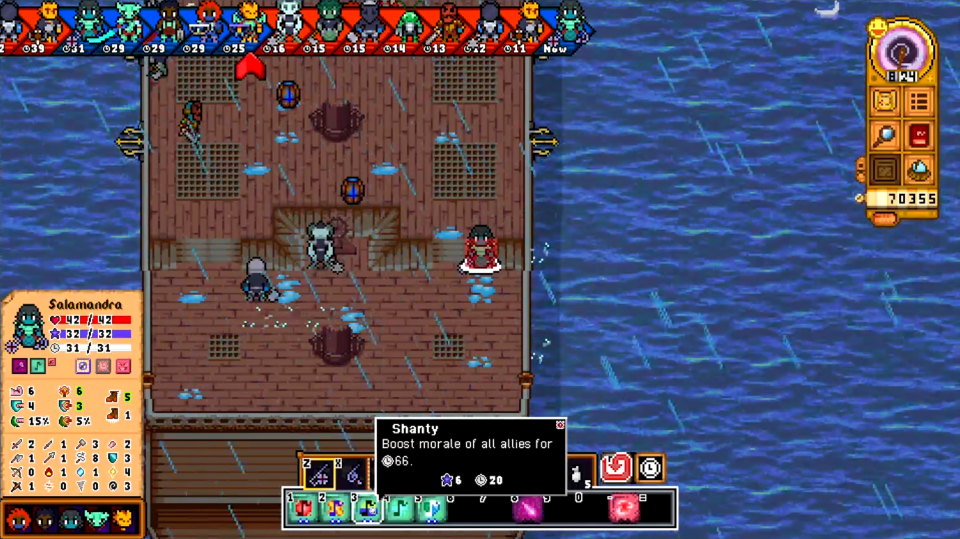
My girlfriend Aura has become an expert at finding fascinating niche indie titles and was adamant I check this one out. I’m so glad she did! While Horizon’s Gate technically came out in 2020, the sizable 1.5 update (which is the version I played) came out in 2021 so I’m going to call it fair game! And goodness, what a game. As a person who’s been making indie games on and off for decades, labors of love like this one hold a special place in my heart. It’s the third in a series, but it was thankfully fine for me to jump in with no prior knowledge. If anything, I’m now even more curious to check out the previous entries since they supposedly take place in the same setting.
Horizon’s Gate had the endearing working title “Boat Tactics” while it was under development, and it’s plain to see why. What if you took your existing fantasy tactical combat engine you’d been using for the past couple of games, and spruced it up to also handle naval combat? The result is an intimidatingly sprawling open world RPG about fighting, sailing, magic, cafés, forbidden technology, commerce, and revenge—with a system so customizable it lets you get away with truly wacky combinations.
And oh, the wacky combos I got away with!
My spellcaster was having too much fun doubling up on combat magic classes so rather than devote half her arsenal to healing spells, I instead gave her a magical bow loaded up with life elemental enchantments so she could shoot her allies with healing arrows (and a tiny bit of actual damage, kept low thanks to her poor archery skill). My muscle bound first mate got ahold of an ability that let her throw her sword, so I multiclassed her into a rogue subclass that let her switch weapons on the fly and she became a walking talking greatsword-chucking machine. My own character—Salamandra, snake-lady scourge of the seas and part-time bard—became adept at whipping her companions into a frenzy while physically whipping her enemies straight off the ship.
Because you can fight with ships, but also on ships! Not since Skies of Arcadia have I had this much fun with ship-to-ship battles. There’s nothing truly like getting accosted by a fleet of pirates only to narrowly win because you rushed in alongside their flagship and physically duked it out with the captain. There’s so much to this game: cartography, trade, exploring a giant world, intrigue, secret training dojos full of murder… There’s a main story, and you’re welcome to follow it at your own pace, but there’s no hurry; you can just sit back, set sail, and see where the current takes you.
5. Make A Good 48 Hour Mega Man Level
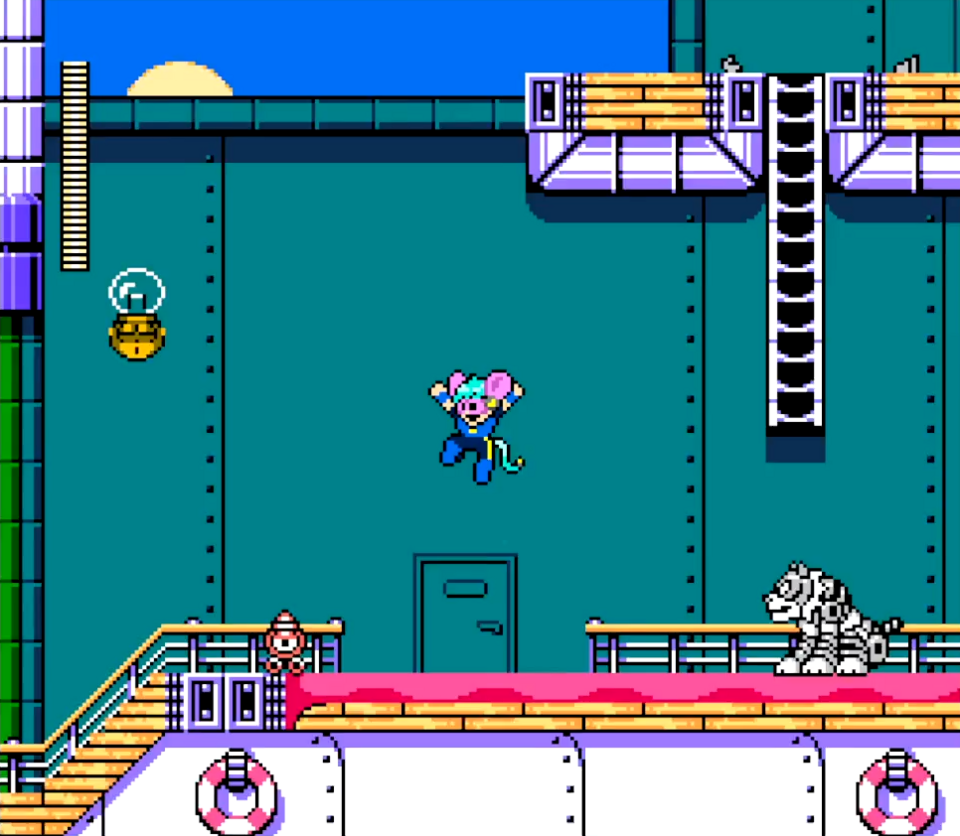
Speaking of sitting back and setting sail, you know who else deserves a vacation? Mega Man! As part of my ongoing stream series Good Morning Mega Man where I make my way through pretty much every single canonical & fan-made game in the greater Rockman universe, I had the pleasure of getting a ticket to the latest compilation by the MaGMML team. Which, coincidentally enough, is set on a cruise ship!
If you’re not familiar, Make A Good Mega Man Level has been a long-running level design contest where Mega Man enthusiasts are tasked with making the best level they can using the Megamix Engine, a powerful tool set made in Game Maker. You absolutely should check out the other compilations, because they’re excellent—especially Episode Zero, which is probably one of my favorite Mega Man games of all time. But it didn’t come out last year; this one did! So back to MaG48HMML.
Sometimes there are no design restrictions for participants, and sometimes there are; such as in this case, where contestants had 48 hours from start to finish to complete a level that had to include a set of random enemies and gimmicks. Sometimes you get dealt a bad hand (which you can thankfully re-roll once or twice). Sometimes you roll up your sleeves and make the most of what you get! And given that there were over a hundred submitted levels, PLUS the bonus curated Wily Fortress section at the end, what we got was a lot of Mega Man content, all wrapped up in a nice little hub world with its own storyline (and an ending that made me smile <3).
The latter is what makes the Make A Good Mega Man Level games so compelling: there is just so much effort put into the glue that holds all these levels together. It would be one thing to just give a pile of playable levels from a menu; no, this is a proper adventure. Mega Man & family are off on a robot cruise, but the dreaded Box Cartel puts a stop to it and it’s up to you to save the day! As Mega Man, or any other character or costume you unlock—even your own! (I played through most of it with a custom sprite of my robot vtuber daughter Zandrabot, which you can get here if you want!)
And like… I’m a completionist, I was stubborn enough to play every single level, complete every sidequest and unlock every upgrade, but you don’t have to. It’s a vacation, after all! You can play just the best levels, or only those that catch your eye, and there’s plenty of quality-of-life features to make sure you have a good time doing it. There’s a sea of Mega Man fangames out there, and I have a new favorite to recommend to folks who want to dip their toe in.
4. Unpacking
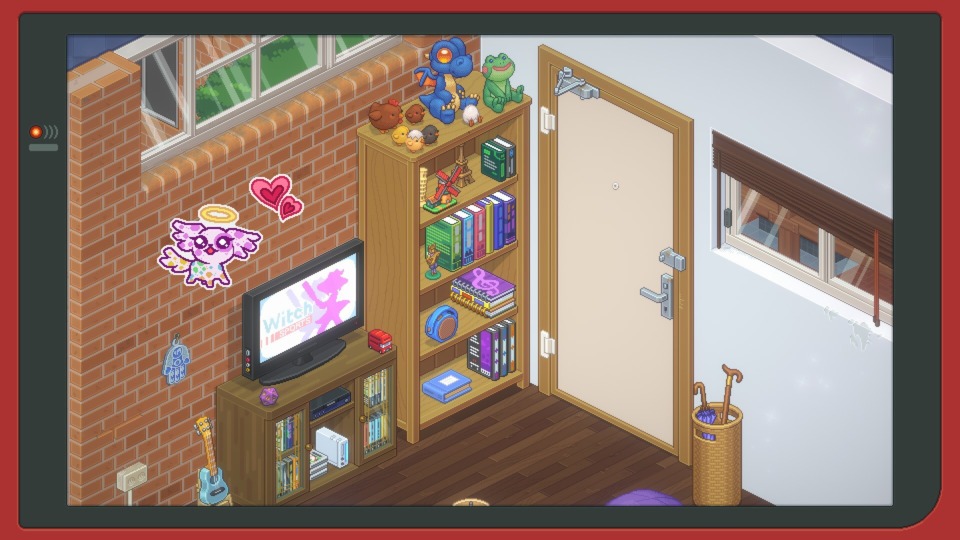
Sooner or later though, the vacation ends, and it’s time to go back home… or move into a new one, as the case may be. Here’s where my completionist streak found its match: Unpacking, the unassuming pixel art zen game about taking things out of boxes and finding places for them on the shelves. Every single thing, down to the last fridge magnet.
I was not prepared for this game’s story to hit me so hard. And like… there’s practically no text! Aside from a short sentence every time you finish one of the game’s handful of levels, you are pretty much left to interpret what’s happening entirely on your own. And it works? It works so well??
The act of placing things itself is delightful (especially if you like arranging things on a shelf nicely), but seeing the same object come back time and time again is truly special. Because there’s continuity! It’s a truly magical moment when you find out that these things you’re unpacking belong to someone, and you’re following that person through important milestones in their life. You get to pick out a place for that favorite plushie, who greets you like an old friend. I never thought I’d love a little pixelated fluff ball so much. And, conversely…
I never thought my most despised character of 2021 would be someone who literally never acts or speaks, is never once named, and is only seen in one blurry pixelated photograph the size of a mouse cursor.
And I hate his guts! It is wild that a video game has made me feel such vivid emotions about a character who is only known to us by what he didn’t do. Throughout Unpacking, you move your protagonist into new home after new home, each one bringing a new twist. Your first time getting more than one room gives you more freedom as to where things go. Your first time moving in with roommates is exciting because you’re the last one in; you have more limited space to work with, but you get to follow your friends’ lead when it comes to theme, and complement what they have—it’s okay everybody, I’ll bring the cute little potato peeler! And the really nice chef’s knife!
But when you move in with your boyfriend in his fancy downtown apartment, it becomes increasingly apparent that there’s not a lot of room for your things. You have to get really creative, which is a fun gameplay puzzle in and of itself. Sometimes you have to stack his plates together, rearrange his fancy wine glass set so it uses less space and you can put your sketchbooks up on the shelves. But where are you going to put your laptop and drawing tablet? Where are you going to work? The living room couch? The weird, tiny kitchen island with the sink in the middle? There’s no space for your things! There’s no space for you.
Because he didn’t make space for you.
He could have. Oh, he could have! He could’ve done a modicum of work to help you move in, to do what your roommates did one move ago, and make this a home for both of you. But he didn’t. And the final nail in that coffin, the moment that hits the hardest, is unpacking that last item, your art school diploma, and finding out that the posters on the wall are the only things you can’t move. You’ve been moving mountains up till now, but you can’t move this. The game doesn’t force you to, but it soon becomes apparent that the only place you can put that diploma, the clearest symbol of your own accomplishments, is on the floor. Out of sight, out of mind.
The next move after that one hit me really hard. But the next one, and the one after, made this one of my favorite games this year. It looks like a game about moving into spaces, but Unpacking is really a game about the space we make for others. I’m still reeling. I’m still amazed. If you had told me before I played that this moving game would have me in tears by the end, I’m not sure I would’ve believed you.
3. Unsighted
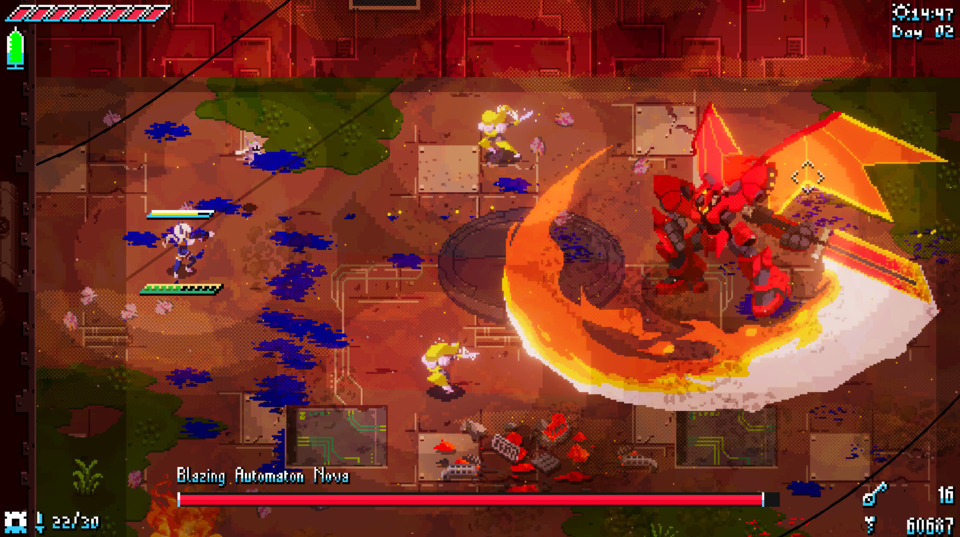
Be really careful about telling someone anything about Unsighted before they play it though! Not since La-Mulana has an action metroidvania relied so much on player knowledge. There are so many things you can do in this game right from the start that you just don’t know about. And that’s the point!
I went into Unsighted suspecting that it might make me frustrated or anxious. For good reason: the premise tasks you with gathering the materials needed to solve a major crisis in your queer robot community, all the while everyone’s personal clock—including your own—slowly ticks down in game time. You can’t save everyone; you have to make choices, distribute the extra time rations as you see fit, and balance exploration (to become stronger and help some people) with making a beeline toward your final goal (to save everyone still standing).
But knowing all that, I decided to go in anyway with the mindset that I would not be able to do it perfectly on my first try. And that’s fine! It’s a game that’s meant to be played and replayed. It’s not particularly long, and there’s lots to discover the second or third time around once you’ve learned some important things about the world—and your own robot body.
And you know what? I had a great time! Sure, I got really grumpy now and then (important note: when a tooltip says you lose everything when X happens, BELIEVE IT), but the way Unsighted kept throwing surprises at me made it all worthwhile. It’s hard to stay mad at a game that has such a colorful and endearing cast of characters, many of whom will pay you back if you help them meet their personal goals. Even with a crisis looming, everyone’s doing their best to survive and thrive—and when parts of a community become stronger, everyone wins.
It also helps that Unsighted is such a fun game to play mechanically. It wears its influences on its sleeve, with several plot items and abilities heavily inspired by popular action adventure games, but the combat and traversal systems tie into each other so well that once I got the hang of parrying and using every tool at my disposal I was raring to get into fights I previously thought I couldn’t win.
That’s one of my favorite things about this game: it occasionally presents you with situations that make you feel like you’re supposed to lose, but where you can prevail if you just have the right bit of knowledge. And Unsighted will not only let you win, but reward you for it. Knowledge is a powerful thing, after all.
2. Library of Ruina
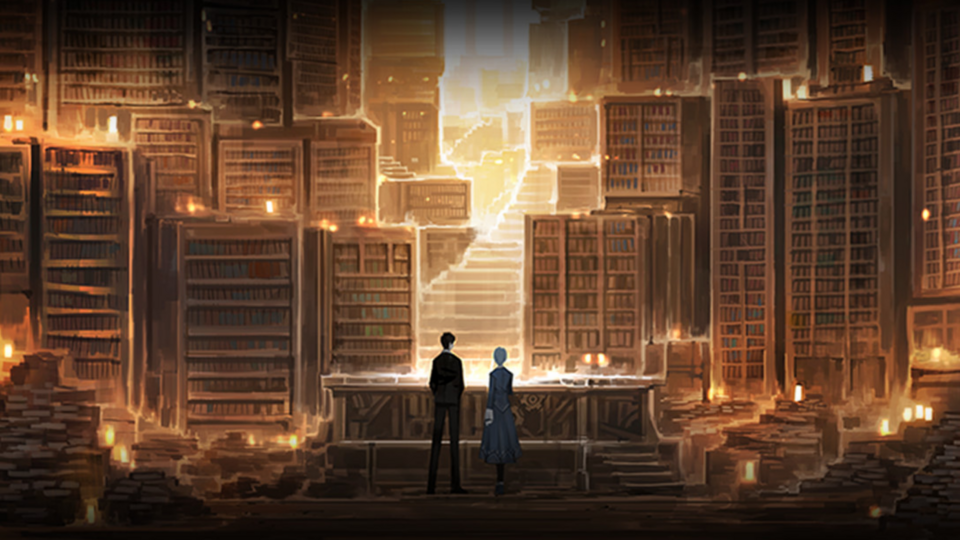
Even if the pursuit of that knowledge sometimes comes at a steep price.
“Wait, Zandra,” you might ask, “you write feel-good stories about turning into catgirls and one of your top games of last year is Bad End Book TF: The Game?” And to that I would say—I mean, first of all, that is a fair question because Library of Ruina absolutely is a game about turning people into books and then shoving them into the gachapon furnace so you can wear their memories—but to that I would say, hell yeah it is.
Library of Ruina: Book, Librarian, Star and City is a turn-based RPG with deckbuilding and cards and dice and dozens of dizzyingly customizable characters fighting it out on an orchestral stage of books and blood. It is without a doubt one of the games that had the biggest impact on me last year. It was the game my girlfriend Amber played with me when she visited last summer, the first time we’d gotten to see each other in over a year and a half. And for a lot of these quiet days of fleeting pandemic closeness, we learned about the Library, and the City in which it resides.
It’s hard to describe the setting concisely; there’s just so much to it, especially if you jump in without having played the (admittedly very different) game that came before it. You’re thrown into this sprawling, almost cyberpunk metropolis so colossal that one of its resident corporations is known primarily for the convenience of its trains that teleport to their destination. It certainly sounds futuristic: giant companies fighting and trading, each having mastery over a specific aspect of reality. This one sells space, this one sells time. The corporation that can make clones buys that time to instantly mature them to adulthood to hire them out as mercenaries. But where do they get the energy to do all that? They used to buy it from you. Or, more specifically, the SCP-fueled powerplant company whose hollowed-out husk your Library resides in. It’s a bit of a fixer-upper.
The game primarily stars Angela, director and head librarian, and Roland, a fixer (the handymen of mercenaries) who just stumbled into the place. Angela is a robot who wants to be human; to do that, she needs a specific book. To make that book, she needs people; to lure those people in, she needs other books, also made from people, also lured into accepting an invitation. Because, of course, that’s how books are made in this game: if you die inside the Library, you become one. That’s where Roland comes in. The entire game is one long daisy-chain of coercing desperate people to put their life on the line to get back what someone else lost, so that one tortured soul can build a spiral staircase out of the pit she’s been confined to all her life.
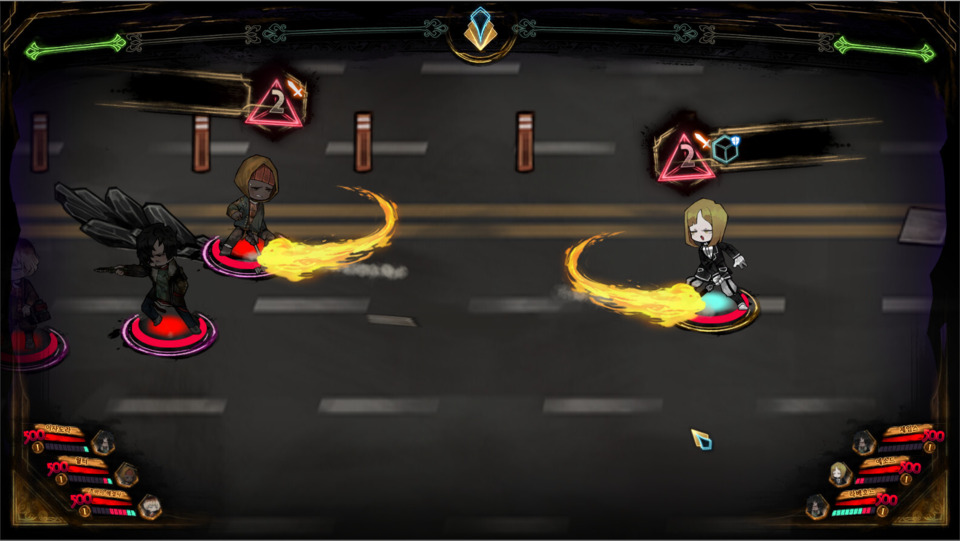
Library of Ruina is about a lot of things, but the theme that resonated with me and Amber the most was the City’s endless, self-perpetuating cycle of violence. It’s no accident; it’s how it was designed. The giant metropolis and the corporations that make up its metaphorical body follow the laws of the mysterious rulers, all revolving around pitting desperate people against each other in as bloody and physical a way as possible. That’s why the Library is first tolerated as an urban legend, then celebrated as a Star of the City: it’s playing by the rules.
There is nothing that those in power will not co-opt if it helps them stay in power. That’s how the City is run, and as the game progresses and Angela recruits more librarians and Roland fights more desperate guests (and deals with the monsters in the basement) it becomes increasingly clear just how much one robot’s quest to become human is going to cost in the end. There’s so much game here, and it’s all worth it.
It’s all so much! Too much to talk about. But I want to! I want to talk about the animal cannibal musicians and the dutiful enforcers who carry out the senselessly brutal tasks in their daily horoscopes. I want to talk about the mercenary company made up entirely of survival-of-the-fittest herbivores. I want to talk about Yesterday’s Promise and L’Heure du Loup and 얀샋ㄷ요무. I want to talk about the people so powerful their names become colors. I DO NOT WANT TO TALK ABOUT LOVE TOWN. I want to talk about the music! The music, my gosh, the music!! The Library is a stage and the soundtrack elevates it to dizzying heights, with many major boss fights even getting their own thematic songs with lyrics! There are so many things I want to talk about, and not enough pages.
I want to talk about the dozens and dozens of everyday people with their own wants and desires, doing their best to survive in this terrible place, each with their own story… each story ending at the Library, trapped within the pages of another book on the pile.
That pile grows so tall, in the end.
The thing about having a lifelong quest is that you inevitably change along the way. When you’re confronted with the true cost of everything you’ve sunk into it, will the new you—still imperfect, still growing, but now with their own hopes and dreams—keep going regardless? Will you step back from the brink? Will it be too late?
1. Get in the Car, Loser!
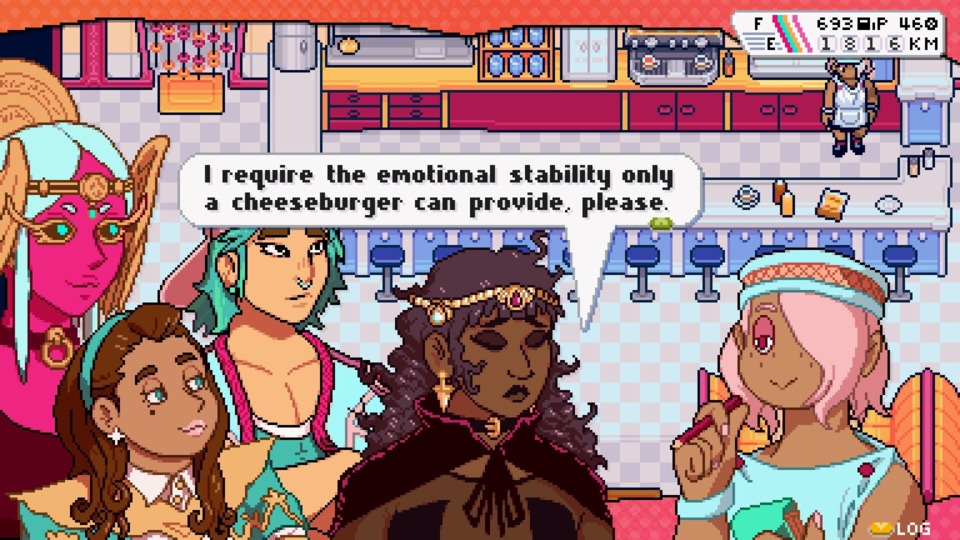
What if you choose to act before it’s too late?
What if you were just minding your own business, trying to survive in a world where the actual literal devil wakes up every 1,000 years to fight fate’s chosen heroes at the end of the world and the next battle is set to happen in your lifetime? Say your best friend who you’re lowkey attracted to drove up with her boyfriend and she said "GET IN THE CAR, LOSER! I know you're not up to anything this summer, I've got the Sword of Fate, and there's an ancient evil that needs to be sealed away." What then?
What if you played a queer road trip RPG that’s a love letter to Final Fantasy XIII but you yourself had never played that one? Well, there’s a chance it might be your favorite game of last year, but maybe that’s just me. Still, there’s never been a better time to check it out for yourself—the game’s free, after all! And if it does end up being your jam, there’s a beach vacation side story DLC that comes with professionally-designed beachwear for the gang AND one of my favorite new characters of last year (plus her interdimensional sword thief girlfriend).
But also, this game’s combat system was super refreshing to play. Four party members, four face buttons on the controller, bam! And to add variety, three loadouts to cycle through—who likes loadouts? I like loadouts! The combat, which admittedly is a pretty big part of this game considering the genre, never really got stale for me on account of how quickly it went once I understood the rhyme and rhythm of what you’re supposed to do. It became a lot of fun to mess with the different equipped abilities between battles, and soon enough I’d put together a well-oiled machine of ravage & damage. Plus, the game has one of those battle themes you don’t get tired of hearing even after a hundred fights.
Okay so THE SOUNDTRACK. It has been very difficult for me to talk about Get in the Car, Loser’s soundtrack because I just end up swearing profusely—and I like to keep it clean, you know? It’s that good. Not only is the main battle theme so catchy (with lyrics!!) that I eventually started singing along with it (good thing there’s a karaoke version on the album), not only do the multiple tracks with vocals send shivers down my spine (there’s a choir? in one of the boss themes??), but the rest of the OST is just as rock-solid! The individual thematic tracks for each leg of the journey give their respective acts of the story a ton of character, which is pretty fitting considering they’re actually diegetic. The radio in this world is an otherworldly entity in and of itself, which plays from the titular car’s speakers in and out of battle. There’s even a radio host cheering you on! Christa Lee knocked it out of the park with the tunes, Jami Lynne cast a spell with the vocals. Absolutely masterful work. The album has been part of my everyday music rotation since I played the game and I don’t plan on stopping anytime soon.
But it’s hard to gush about one aspect of this game without mentioning the others; the characters and backgrounds look terrific, the victory pose postcards (or, victory posecards) give the party members a ton of extra charm, the shaders are on another level… and the writing is so good?? Not only does each item in the game also come with its own unlockable bit of fun lore, but as someone who’s terminally online I felt right at home reading the punctuation-optional, relentlessly flirty road trip banter that comprises the bulk of time spent between battles and celebratory diner visits. Not to mention all the times that writer/programmer/designer Christine Love just outright surprises you out of the blue with a “you can’t DO that!!”-inducing piece of writing. Have you ever played a game that made you go “oh, it’d be really funny if this happened” and then it immediately did? This exact sequence of events took place so many times during my playthrough that I started to wonder if the game was reading my mind.
Remember when I said I don’t like to stream games that make me flustered? For this game, I made an exception. And my cheeks were BURNING for a lot of my playthrough. I was ruthlessly called out time and time again in a way that would sting more if it wasn’t so utterly validating. It’s nice to play a game that’s extra in exactly the way you tend to be, you know? It’s been a good year for games starring gay disasters.
Speaking of which, getting to meet the cast in this game was interesting for me because there wasn’t immediately a character I could 100% relate to. Not even the titular loser which, you know, you would think I’d completely latch onto. So I got to see a part of myself in each one: the hero Grace who kicks off the whole adventure (and is an endearingly self-aware kind of larger-than-life); the driver Valentin who absolutely positively never stops flirting (and facetanks through everything with a smile); the cosmic powerhouse Angela who is literally the only angel who understands the need to take action (and whose wholesomeness is only rivaled by her sparing, strategic use of being a complete gremlin)…
And then there’s Sam. The player viewpoint character is also the world’s least confident hot goth sorceress, who rounds out the party with healing and stagger abilities. It’s not often that a game directly inspired by JRPGs makes the protagonist a support character; rarer still, one where that fact is a major plot point that deeply affects their personal storyline. Sam really grew on me, in ways I wasn’t prepared for. Heck, she gets an entire act to herself in a fit of introspection that was so powerful its background music now brings up intense emotions whenever I listen to it. I guess I should’ve expected it; pretty much every single character in media I fiercely relate to starts out as someone I’m either lukewarm on or antagonistic towards, right up until the very moment I realize “ohhh no, she’s ME.”
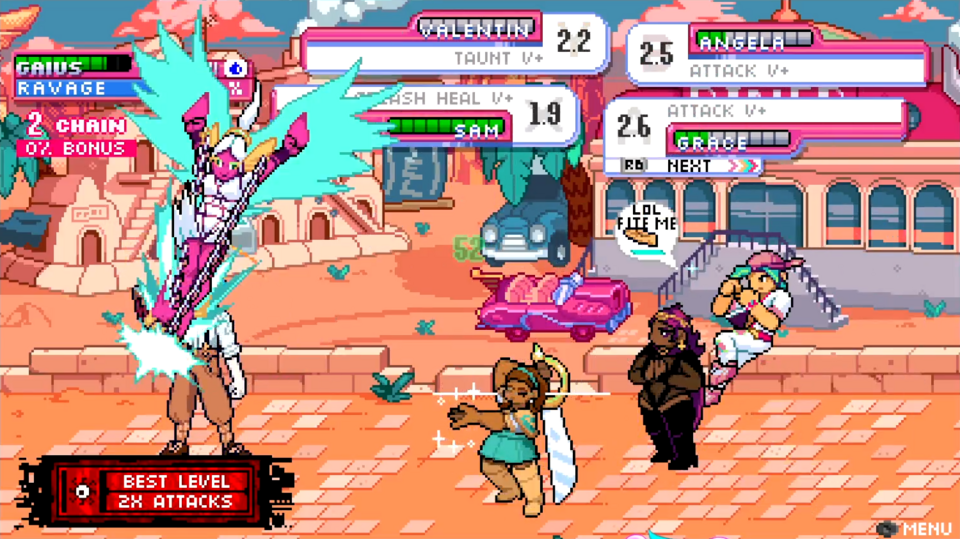
So! Get in the Car, Loser takes place in a really neat modern-fantasy setting, an idyllic (if you don’t mind the encroaching Machine Devil cultists) pastel-colored seaside civilization somewhere under actual literal heaven, with angels and everything. And swords. And neon-colored convertibles! This is the atomic age, after all. And everything is slowly getting really bad because the Machine Devil cultists are doing the thing they do every millennium and trying to revive their sleeping god as they take over and raze more and more of the countryside—but it’s not time quite yet, is it? Still got what, 12 years left on the clock? Heaven’s not too concerned. There’s a proper time and place for everything, after all. “Besides,” the Divine Order says, “if we struck at them first wouldn’t that make us just as bad as them?”
As timely as this plotline is and, unfortunately, as real-world-tired as this argument is, it always tends to overlook the fact that the first punch got thrown a long time ago. Violence comes in many shapes, some of which most people don’t notice until it’s hitting them square in the face. They—both the in-game Machine Devil cultists and the real-world bigots—started the fight long ago. Their arsenal of violence has been as varied as it has been plentiful, used as many times as they could get away with. “What do you have against free speech,” they say when you strike back, “can’t you take a joke?”
But the truth is, yeah, we sure can. We’ve been doing that our entire lives. There’s not a single poor bigoted excuse for a joke that we haven’t heard before, sometimes—often—from ourselves. You don’t get to figure yourself out without asking a lot of really personal questions. You don’t get to come out to the world before coming out to yourself. And to do that, you have to make it through a LOT of doubts; a lot of criticism, a lot of second-guessing. Maybe that’s why Sam’s overuse of self-deprecating humor hits so close to home for me; it can soften the blow if you put yourself down before others do it, because at least then you can trust yourself to hold your punches back a bit. But say hurtful things about yourself enough, even in jest, and you eventually start to believe it.
And it’s hard to stop doing it, I know from experience! It’s really hard! But it’s important. We shouldn’t tolerate someone saying hurtful things about us, even if that someone is us. Especially if it’s us. By standing up for ourselves now, we get better at standing up for others. We get better at standing up for our future selves, too! The ones we’re doing all this questioning and transitioning and coming out for!
That’s one of the truths in this game—delivered in fourth-wall-breaking big bold text, because subtext is for cowards—that hit me the hardest. Of course our future selves deserve our support. Therefore by extension, so do our present selves. And that means, so do our past selves. Yes, even the shy nerds who had no idea what they were doing! They were doing their best, turns out! The best they could do with what they had at the time. There is no magical point in the past where we suddenly became worthy of the person we are today; it’s always been there. We have always been worthy of love. It’s not too late to open our hearts. It’s not too late to stand up for every person we have been, and every person we will be.
After all, this game’s premise is about taking the fight to the big bad final boss before the people in power say we’re supposed to. There’s no time like the present! The best time to fight back against bigotry was 20 years ago; the second-best time is now.
So let’s get in the car already!
And let’s keep making wonderful things together. <3